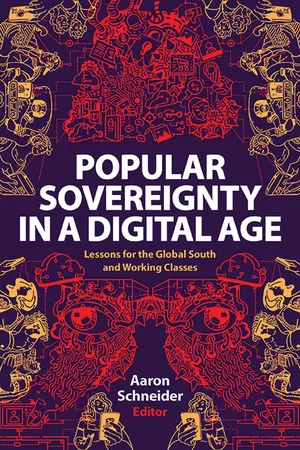
Popular Sovereignty in a Digital Age
Lessons for the Global South and Working Classes
- 304 pages
- English
- ePUB (mobile friendly)
- Available on iOS & Android
Popular Sovereignty in a Digital Age
Lessons for the Global South and Working Classes
About this book
Looks at how digitalization has changed the way we produce and interact, and the implications for working classes and countries of the Global South.
In the evolution of global capitalism and geopolitics, digitalization presents a new and yet unresolved chapter. In the lead up to digitalization, neoliberalism weakened the welfare states of the Global North and the developmental states of the Global South where they existed. Neoliberalism also disorganized working classes, as Left parties and labor organization declined across the globe. Into this deregulated and unchecked context, digitalization proceeded, and technology companies inserted themselves into multiple sectors, making use of first mover advantage and monopolistic practices to drive out smaller and less advanced firms. We can now characterize a landscape in which states have been weakened, working classes disorganized, and rival firms greatly handicapped, allowing big tech to operate as all-powerful quasi-monopolies. They enjoy unprecedented concentration of wealth, power, and advantage. Worryingly, deregulated technology now penetrates many areas of life with surveillance and control, setting us on a path towards anti-democratic, neo-imperial, and exclusionary futures. Aaron Schneider offers a popular and sovereign alternative, with particular focus on labor and the Global South.
Frequently asked questions
- Essential is ideal for learners and professionals who enjoy exploring a wide range of subjects. Access the Essential Library with 800,000+ trusted titles and best-sellers across business, personal growth, and the humanities. Includes unlimited reading time and Standard Read Aloud voice.
- Complete: Perfect for advanced learners and researchers needing full, unrestricted access. Unlock 1.4M+ books across hundreds of subjects, including academic and specialized titles. The Complete Plan also includes advanced features like Premium Read Aloud and Research Assistant.
Please note we cannot support devices running on iOS 13 and Android 7 or earlier. Learn more about using the app.
Information
Table of contents
- Cover
- Title
- Copyright
- Contents
- Acknowledgments
- 1. Introduction
- Future Histories
- Tech, Capital, and Collectivities
- Digital States, Democracy, and Development
- List of Contributors
- References
- Index
- Back Cover